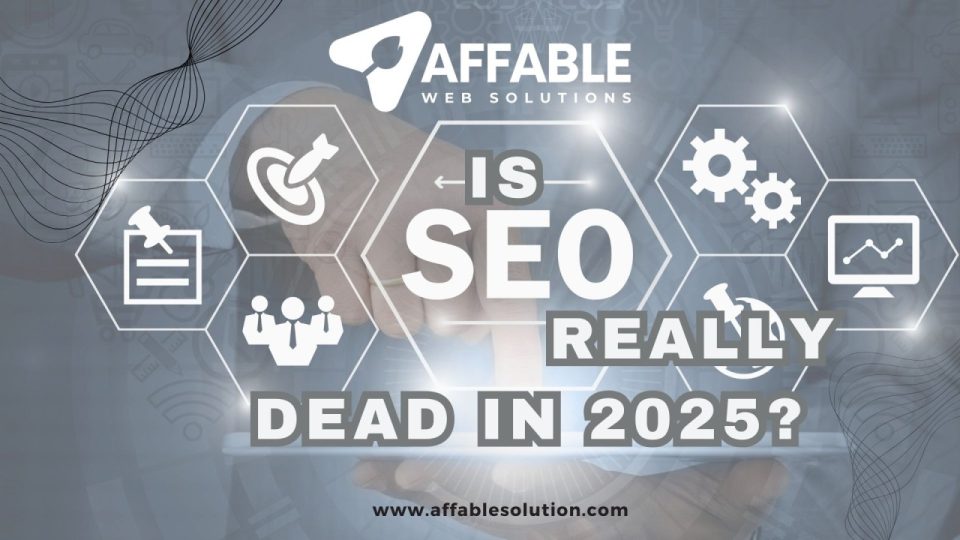Somewhere, probably on LinkedIn, someone has already announced that SEO is dead.
They’ve written a dramatic post with a sad face emoji and probably followed it up with a pitch for their short-form video course. “You don’t need SEO anymore,” they say, “just go viral.”
Which is like saying you don’t need roads because you bought a pogo stick.
So let’s answer the question:
Is SEO still worth it in 2025?
Yes. But not the way you’ve been doing it.
SEO Has Changed – But So Has Everything Else
Back when Google was young and a bit naïve, you could stuff your page with keywords like “best plumber London plumbing plumbery tap tap pipe emergency” and it would nod politely and put you on page one.
Then it got older. Grew suspicious. Hired some very clever machines.
Now it checks if you actually know what you’re talking about. It wants to see proper content, local signs, and proof that you exist outside of a WordPress theme.
So if you’re asking whether the old SEO still works — no, it doesn’t.
But the new SEO, the grown-up version that’s part search, part reputation, part useful advice? That still works. If anything, it works better. Because most people are still doing it badly.
What Works in 2025
- Content That Sounds Like a Person
Not a chatbot. Not a lecture.
If you can explain what you do to a grumpy uncle without losing him halfway through, you’re on the right track. If you cannot, find a freelance SEO specialist who can.
Say what you do. Where do you do it? Why it helps.
“We increase website visitors to your local business in Swindon. Monthly contracts. No waffle.”
That’s better than a paragraph about “Growth solutions for modern businesses.”
Proper Local Signals
If you’re a local business and don’t mention your town, postcode or nearby landmarks, Google won’t guess.
Say where you are. Put it in your page titles. Write about local things. Show you’re not just pretending to live there from a coffee shop in Kent.
A Website That Doesn’t Annoy People
If your site loads slower than a pensioner on dial-up and looks like it was designed during the reign of Queen Victoria, people leave.
Google notices. It sulks. You drop.
Fast sites win. Clear sites win. Sites with working buttons win.
Real Reviews from Real People
Google reads reviews. It doesn’t care about stars alone. It looks for patterns. It reads what people say.
If they mention the service and location? Bonus.
If they write “great!” and nothing else, you get less credit than you think.
What Doesn’t Work (Stop Wasting Your Time)
- Buying 5,000 backlinks from a website that also sells dog vitamins
- Writing the same blog post 37 times with slightly different headlines
- Ignoring your Google Business profile like it’s a broken fax machine
- Using AI to generate 10,000 words of fluff and calling it a strategy
- Thinking TikTok views mean people will Google your business
SEO works when it helps people find you and understand what you offer. That’s it. Anything else is theatre.
Who Should Still Bother With SEO?
You should, if:
- You run a business people look for online
- You want people to find you without paying Google every time they click
- You’re willing to be clear, honest and slightly better than your rivals
You shouldn’t, if:
- You think SEO means tricking search engines
- You want instant results
- You believe writing a blog post once in 2017 is still helping
What We Tell Clients in One Sentence
“If you aren’t on Google when someone’s ready to buy, you might as well not exist.”
It’s a bit blunt. But true.
People don’t scroll past page one. Most don’t even scroll at all. They tap. They pick. They go.
If you’re not there, they won’t wait for you to catch up.
So, Is It Still Worth It?
Yes. SEO in 2025 still works.
But only if you do it properly.
Talk like a person. Write like you mean it. Sort out your website.
And for the love of all that’s holy, stop stuffing pages with meaningless words and hoping for the best.
Google has seen it all before.
And it’s not impressed.

